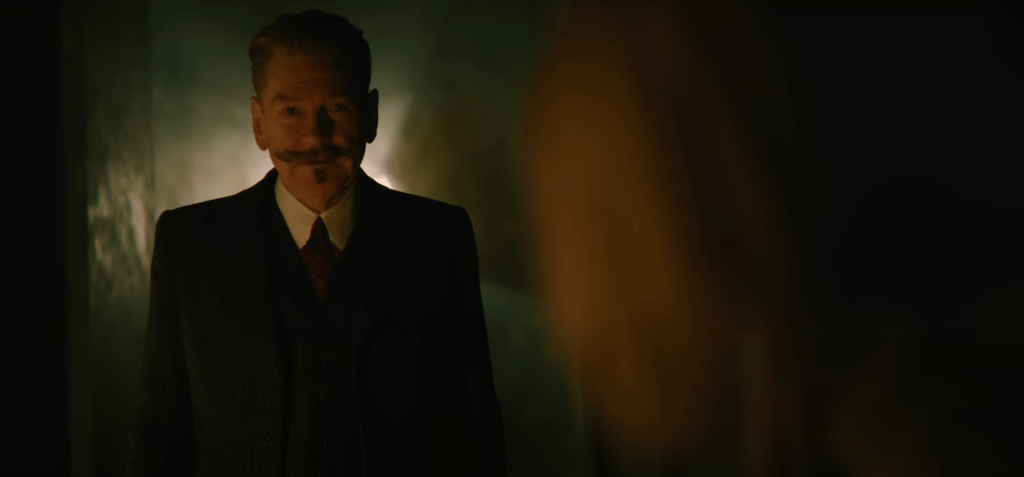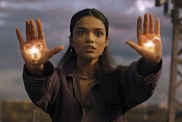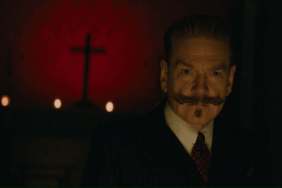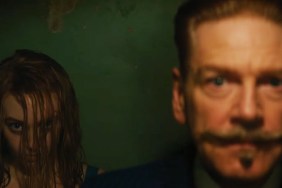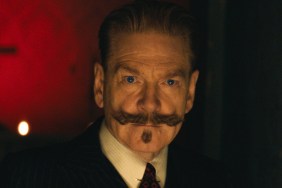Less than two years after Hercule Poirot appeared on the big screen in Death on the Nile, Kenneth Branagh is back to direct and star in a new installment of his Agatha Christie adaptations. This time, he adapts Hallowe’en Party into A Haunting in Venice, a murder mystery movie set in a mansion on the night of a seance. This film infuses the genre tropes of Murder on the Orient Express and its predecessor with the horror genre to mixed results. Each movie in Branagh’s series has been varying levels of mediocre, with the first one likely being the most watchable. However, this one is a disappointment.
The selling point of all these movies is the star-studded cast. This outing might have fewer familiar faces, but there is a lot of talent on display here. Oscar-winner Michelle Yeoh (damn, it feels good to type that) appears in the film as Joyce Reynolds, the medium who leads the seance. She is a brilliant performer getting her time to shine, as she sells every moment and commands the screen. Tina Fey appears as Ariadne Oliver in her first non-comedic film, and she gets to flex a different muscle here than what we’re used to. Branagh also reunites with Jamie Dornan from the critically acclaimed Belfast, and the results work well for this genre blend.
Perhaps the most interesting aspect of A Haunting in Venice is the element of supernatural horror. Early on, it is established that Poirot has seen too much crime and murder to believe in a god. This is a fascinating way to characterize him; his worldview makes sense with his experiences. What makes the premise work is that the possible presence of spirits challenges his worldview. Yet, Poirot will always look for a rational explanation for strange events to maintain his beliefs. The conflict here is wonderful, but the execution is where the movie gets lost.
When you incorporate the horror genre into a franchise that is not known for scares, you invite people to watch the film with a different set of glasses. It’s called A Haunting in Venice, and that teaser trailer starts off looking like a Conjuring movie. The premise of locking a bunch of people in a mansion on a stormy night, not knowing who will die next, who the killer may be, or if the killer is a ghost, is horror perfection. Yet, the execution is not where it should be. From a horror perspective, this movie can be quite pathetic, relying on jump scare after jump scare to startle the audience.
The issue with the jump scares is that they don’t feel motivated. Characters will be talking, and then, all of a sudden, something falls down near them, creating a loud sound. This is startling, not scary. There are many moments where we’ll have silence, and then an infernal bird screeches into the room. Why does this godforsaken bird have such active vocal cords? Because Branagh wanted you to jump in your seat a little. There is no suspense or specific horror sequences that will pull you to the edge of your seat or make you want to cover your eyes. There are only loud sounds. And whenever it’s not doing that, we get predictable scares like Poirot looking in the bathroom mirror and seeing a ghost girl behind him.
Branagh does direct with style, but sometimes, that style can be distracting. He shoots much of this film with ultra-wide lenses. The field of view is so wide during a few of the shots that the sides of the frame become distorted. He shows off here and there, twisting the camera and sometimes mounting the camera to himself as Poirot so we get some Snorricam shots from his perspective. These stylistic moments are interesting but can also take one out of the movie because they feel like a filmmaker’s deliberate choices.
Furthermore, the second act of A Haunting in Venice is the weakest element. It features Poirot interrogating a person, and then they go into a monologue where their eyes tear up. He talks to another person, and then we have another teary-eyed monologue. We have no less than five teary-eyed monologues to the point where it becomes repetitive. The final act is where things pick up a little because in every murder mystery, this is where the truth is revealed in a big twist. This movie is no exception, and the final few minutes are also where we finally have an unsettling idea that belongs in a horror movie. It does away with the cheap jump scares and goes for an emotional, terrifying revelation.
However, it’s not enough to save a movie that doesn’t fully execute its premise. With Knives Out and Poker Face, Rian Johnson currently owns the monopoly of the cinematic whodunnit, and nobody, not even Hercule Poirot’s gargantuan mustache, can compete.
SCORE: 5/10
As ComingSoon’s review policy explains, a score of 5 equates to “Mediocre.” The positives and negatives wind up negating each other, making it a wash.
